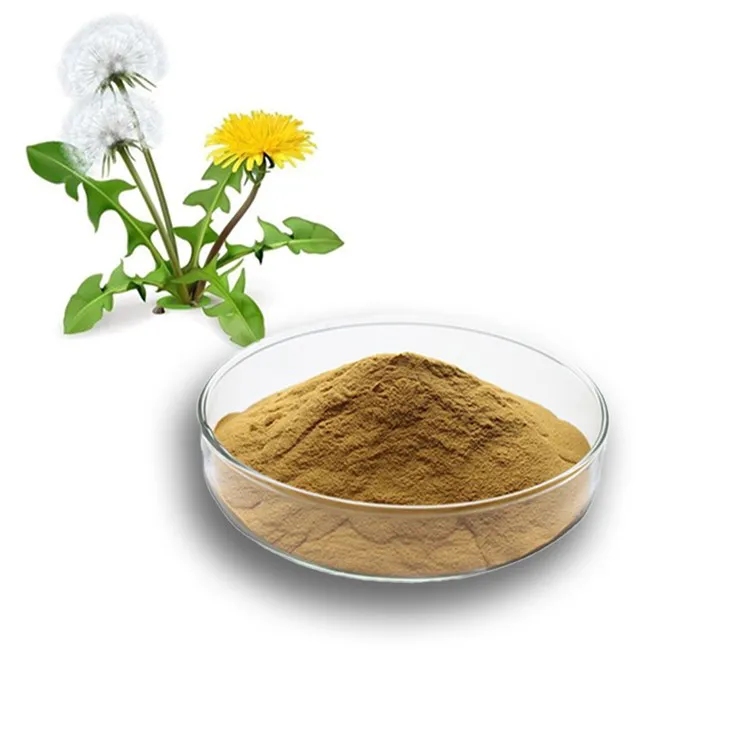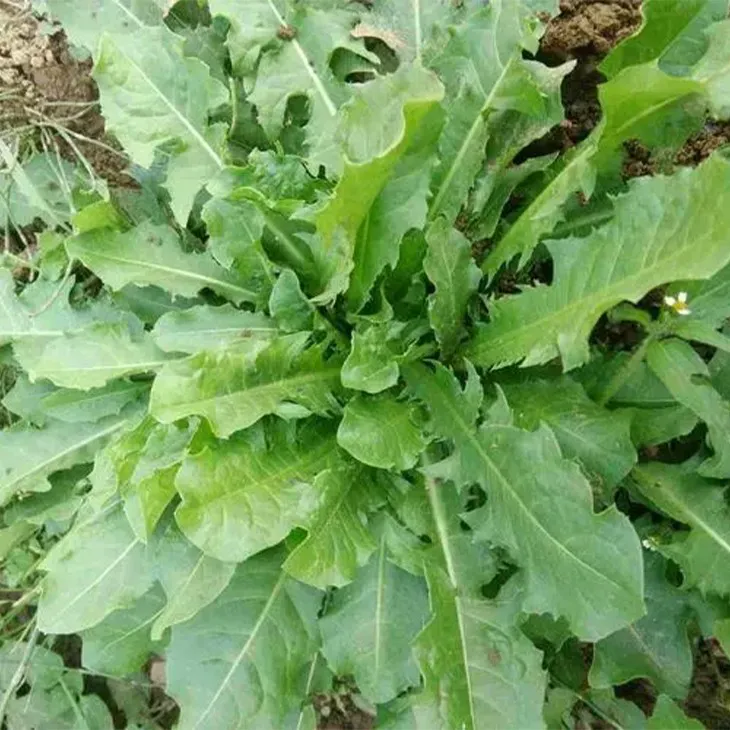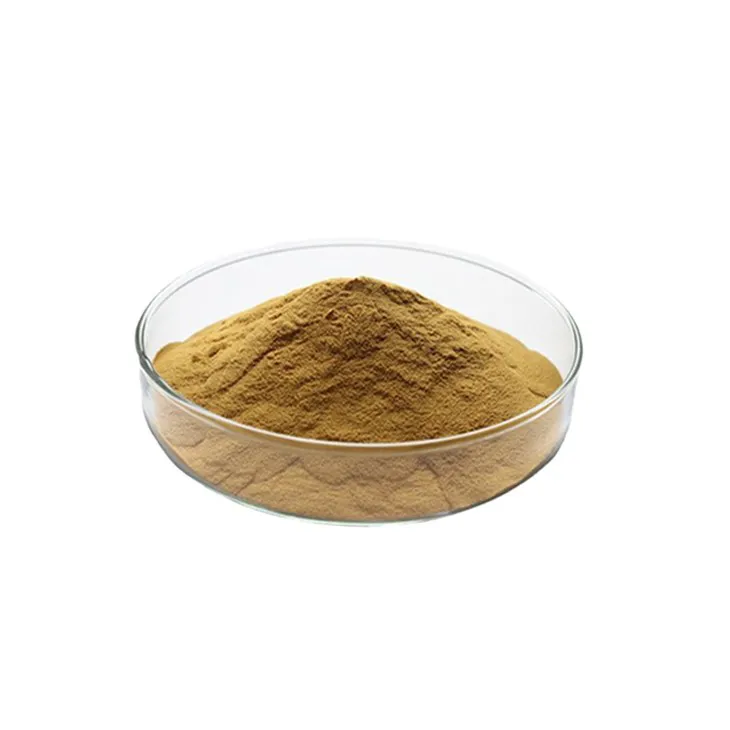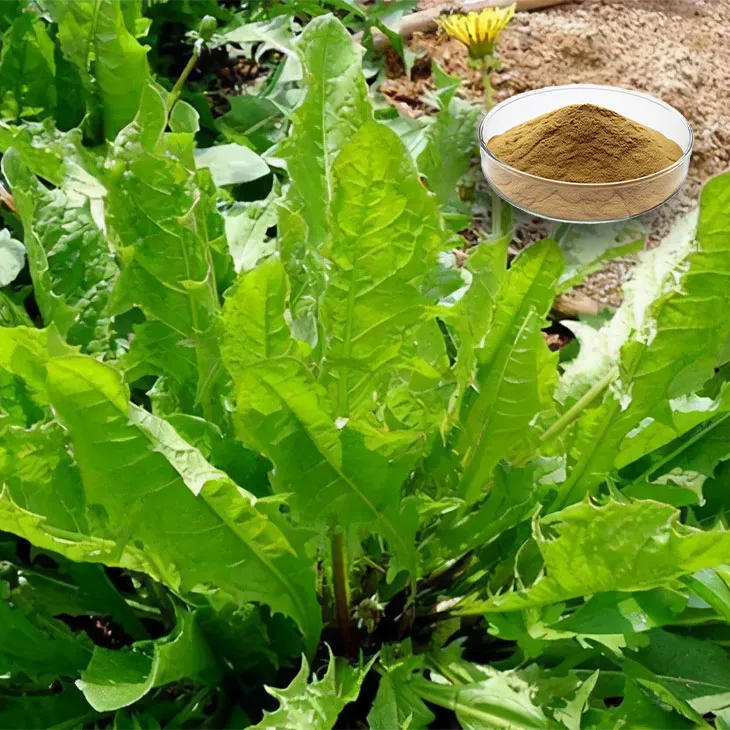- 0086-571-85302990
- sales@greenskybio.com
Best Answers to 7 Key Questions about Dandelion Leaf Extract.
2024-12-17

1. What is Dandelion Leaf Extract?
Dandelion Leaf Extract is a substance derived from the leaves of the dandelion plant (Taraxacum officinale). The dandelion is a common plant that is often considered a weed in many lawns and gardens, but it has a long history of use in traditional medicine. The extract is obtained through various methods, such as drying and grinding the leaves, and then using solvents like alcohol or water to extract the active compounds. It contains a variety of bioactive components, including flavonoids, phenolic acids, terpenoids, and vitamins (such as vitamin A, C, and K). These components are thought to contribute to the potential health benefits associated with Dandelion Leaf Extract.

2. What are the Potential Health Benefits?
Digestive Health
- Dandelion leaf extract has been traditionally used to support digestion. It may act as a mild laxative, helping to relieve constipation. The bitter compounds present in the extract can stimulate the production of digestive juices, such as bile and gastric juices, which can enhance the breakdown and absorption of food.
- It may also have a prebiotic - like effect, promoting the growth of beneficial gut bacteria. This can contribute to a healthy gut microbiome, which is associated with overall well - being and a reduced risk of various diseases.
- The extract is known for its diuretic properties. It can increase urine production, which may be beneficial for people with fluid retention or edema. By promoting the elimination of excess water from the body, it can potentially reduce swelling in the legs, ankles, and other parts of the body.
- However, it's important to note that while it can increase urine output, it should not be used as a substitute for medical treatment in cases of severe fluid imbalances or kidney problems.
- The flavonoids and phenolic acids in dandelion leaf extract have antioxidant properties. Antioxidants help to neutralize free radicals in the body, which are unstable molecules that can cause damage to cells and contribute to the development of chronic diseases, such as cancer, heart disease, and neurodegenerative disorders.
- By scavenging free radicals, dandelion leaf extract may help protect the body's cells from oxidative stress and support overall health.
- Some studies suggest that dandelion leaf extract may have anti - inflammatory properties. Chronic inflammation is associated with many health problems, including arthritis, diabetes, and certain autoimmune diseases.
- The terpenoids and other compounds in the extract may help reduce inflammation in the body, potentially alleviating symptoms associated with inflammatory conditions.

3. Are there any Side Effects?
While dandelion leaf extract is generally considered safe for most people when used in moderation, there are some potential side effects to be aware of.
- Allergic Reactions: Some individuals may be allergic to dandelion. Allergic reactions can range from mild skin rashes to more severe symptoms such as difficulty breathing or swelling of the face, lips, or tongue. People with known allergies to other plants in the Asteraceae family (such as ragweed, chrysanthemums, or daisies) may be at a higher risk of being allergic to dandelion.
- Digestive Upset: In some cases, the bitter compounds in the extract may cause digestive discomfort, such as nausea, vomiting, or diarrhea, especially if consumed in large amounts or on an empty stomach.
- Interactions with Medications: Dandelion leaf extract may interact with certain medications. For example, its diuretic effects could potentially interact with medications used to treat high blood pressure or heart conditions. It may also interact with drugs that are metabolized by the liver, as some of the compounds in the extract can affect liver enzyme activity. Therefore, it's important to consult a healthcare provider before using dandelion leaf extract if you are taking any medications.

4. How is it Consumed?
Dandelion leaf extract can be consumed in several ways:
- Tea: One of the most common ways to consume it is as a tea. Dried dandelion leaves can be steeped in hot water for about 10 - 15 minutes to make a tea. This tea can be sweetened with honey or other natural sweeteners if desired. Drinking dandelion leaf tea regularly can be a simple way to incorporate the extract into your diet.
- Capsules and Supplements: Dandelion leaf extract is also available in the form of capsules and dietary supplements. These are convenient options for those who prefer a more concentrated form or who find the taste of the tea unappealing. When choosing a supplement, it's important to look for a reputable brand that follows good manufacturing practices to ensure quality and safety.
- Tinctures: A tincture is a liquid extract made by soaking the dandelion leaves in alcohol or a mixture of alcohol and water. Tinctures are typically taken in small doses, usually a few drops at a time, diluted in water or juice. They are often used in herbal medicine and can provide a more potent form of the extract.

5. What is the Recommended Dosage?
There is no standardized, one - size - fits - all recommended dosage for dandelion leaf extract. The appropriate dosage can vary depending on several factors, such as the individual's age, health status, and the intended use of the extract.
- When consumed as a tea, a general guideline is to use about 1 - 2 teaspoons of dried dandelion leaves per cup of water. However, this can be adjusted according to personal taste and tolerance.
- For capsules and supplements, it's best to follow the manufacturer's recommended dosage. Typically, dosages can range from 500 - 1000 mg per day, but again, this may vary depending on the product and the individual.
- When using a tincture, a common starting dose might be 1 - 2 ml, diluted in water or juice, up to three times a day. However, it's crucial to start with a low dose and gradually increase it while monitoring for any adverse effects.
6. How to Ensure Quality and Purity?
To ensure the quality and purity of dandelion leaf extract:
- Source: Look for products that source their dandelion leaves from clean, non - contaminated environments. Organic dandelion leaf extract may be a better choice as it is less likely to contain pesticides or other harmful chemicals. The plant should be sourced from areas where it is known to grow without exposure to industrial pollutants or heavy metals.
- Manufacturing Process: Choose products from manufacturers that follow good manufacturing practices (GMP). GMP - compliant facilities adhere to strict quality control standards in terms of extraction methods, purification, and packaging. This helps ensure that the final product is free from contaminants and contains the correct amount of active ingredients.
- Testing: Reputable manufacturers will often conduct third - party testing on their products. Look for products that have been tested for purity, potency, and the presence of contaminants such as heavy metals, pesticides, and microbial agents. Third - party testing provides an independent assessment of the product's quality and can give consumers more confidence in the product they are purchasing.
7. Can it be Used by Everyone?
While dandelion leaf extract has many potential benefits, it may not be suitable for everyone.
- Pregnant and Nursing Women: There is limited research on the safety of dandelion leaf extract during pregnancy and breastfeeding. Due to its potential effects on the body, such as its diuretic and possible hormonal effects, it is generally recommended that pregnant and nursing women avoid using dandelion leaf extract without first consulting a healthcare provider.
- People with Kidney or Liver Problems: As mentioned earlier, dandelion leaf extract can interact with the kidneys and liver. People with pre - existing kidney or liver diseases, such as kidney failure or liver cirrhosis, should use extreme caution when considering using the extract. It may be necessary to consult a doctor or a specialist in herbal medicine to determine if it is safe for them.
- Children: There is also insufficient data on the use of dandelion leaf extract in children. The developing bodies of children may respond differently to herbal products, and their smaller body size means that they may be more sensitive to the potential effects of the extract. Therefore, it is not recommended to give dandelion leaf extract to children without medical advice.
FAQ:
Question 1: What are the main health benefits of dandelion leaf extract?
Dandelion leaf extract is believed to have several health benefits. It may act as a diuretic, helping the body to eliminate excess water and toxins. It also contains antioxidants that can combat free radicals in the body, potentially reducing the risk of chronic diseases. Additionally, it may support liver and digestive health, as it has been associated with promoting bile production and improving digestion.
Question 2: How is dandelion leaf extract made?
Dandelion leaves are typically harvested first. Then, they can be dried and ground into a powder. The extract can be obtained through various methods such as solvent extraction, where a suitable solvent like ethanol or water is used to draw out the active compounds from the ground dandelion leaves. After extraction, the solvent is usually removed, leaving behind the concentrated dandelion leaf extract.
Question 3: Are there any side effects of dandelion leaf extract?
While dandelion leaf extract is generally considered safe for most people when used in moderation, some individuals may experience side effects. It can cause allergic reactions in those who are allergic to dandelions. Since it has diuretic properties, excessive use may lead to dehydration or electrolyte imbalances. Also, it may interact with certain medications, so it is important to consult a healthcare provider if you are taking other drugs.
Question 4: Can dandelion leaf extract help with weight loss?
There is some evidence to suggest that dandelion leaf extract may aid in weight loss. Its diuretic effect can cause a temporary reduction in water weight. Moreover, its potential to support liver function and digestion may contribute to a more efficient metabolism. However, it is not a magic solution for weight loss and should be combined with a healthy diet and regular exercise.
Question 5: How should dandelion leaf extract be taken?
Dandelion leaf extract can be taken in various forms. It is available as capsules, tablets, tinctures, or in powdered form. If taking capsules or tablets, follow the recommended dosage on the product label. For tinctures, the appropriate dosage is usually a few drops diluted in water, and for the powdered form, it can be mixed with food or beverages. However, it is advisable to consult a healthcare professional before starting any new supplement regimen.
Question 6: Is dandelion leaf extract suitable for everyone?
No, it is not suitable for everyone. Pregnant and breastfeeding women should avoid it as there is not enough research on its safety during these periods. People with kidney problems should also be cautious as its diuretic effect may put additional strain on the kidneys. And as mentioned before, those with dandelion allergies should not take it.
Related literature
- The Benefits and Risks of Dandelion Leaf Extract: A Comprehensive Review"
- "Dandelion Leaf Extract: From Traditional Use to Modern Applications"
- "Understanding Dandelion Leaf Extract: Composition, Properties, and Health Effects"
- ▶ Hesperidin
- ▶ citrus bioflavonoids
- ▶ plant extract
- ▶ lycopene
- ▶ Diosmin
- ▶ Grape seed extract
- ▶ Sea buckthorn Juice Powder
- ▶ Beetroot powder
- ▶ Hops Extract
- ▶ Artichoke Extract
- ▶ Reishi mushroom extract
- ▶ Astaxanthin
- ▶ Green Tea Extract
- ▶ Curcumin Extract
- ▶ Horse Chestnut Extract
- ▶ Other Problems
- ▶ Boswellia Serrata Extract
- ▶ Resveratrol Extract
- ▶ Marigold Extract
- ▶ Grape Leaf Extract
- ▶ blog3
- ▶ blog4
- ▶ blog5
-
Seven Trends of Dandelion Leaf Extract.
2024-12-17
-
Tongkat Ali Extract
2024-12-17
-
Curcumin
2024-12-17
-
Sophora Japonica Flower Extract
2024-12-17
-
Red Wine Extract
2024-12-17
-
Konjac Powder
2024-12-17
-
Shikone Extract
2024-12-17
-
Fig Extract
2024-12-17
-
Propolis Extract Powder
2024-12-17
-
Sugarcane Extract
2024-12-17
-
Lemon Juice Powder
2024-12-17





















